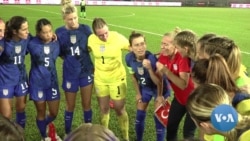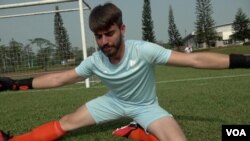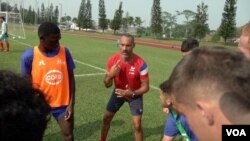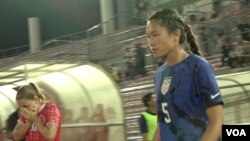At the World Deaf Football Championships 2023, as France’s men’s team warmed up for a game against the Americans, French goalkeeper Matthias Leroy, 24, was on the ground with his back to the grass, rolling slightly side to side, catching ball after ball that the team’s trainer threw at him. Soon after, the whole team huddled, using sign language to discuss game strategy and teamwork.
“Yes, deaf players communicate differently,” Leroy, 24 said. “But other than that, we are not different.”
During the game, the French and U.S. players did exactly what one would expect: playing hard, hustling up and down the field, chasing after the ball and looking for opportunities to score.
“It’s a source of pride to be able to show the world that I can play despite my hearing disability,” Leroy said. “To be able to show that we play beautiful football games like people who are not deaf.”
At the fourth World Deaf Football Championships, men’s and women’s teams from 20 countries competed. Ukraine won the men’s title, and the United States won the women’s crown.
For all the attention players receive on the field many of these athletes have accomplished much off it too.
Leroy is a university student studying psychology. “We won’t be stopped because we’re deaf,” he said.
The Nigeria men’s team midfielder, Mohammed Abubakar, works in the clothes trading business. “We hope the people who see how hard we play on the field realize we can be just as successful off the field,” Abubakar said.
American women’s defender Gracie Fitzgerald, 24, is studying for a master’s degree in environmental engineering at Purdue University in Indiana. She said the fact that everyone on the women’s deaf national team faces similar challenges helps them bond.
“When I first met everybody on the team, I was just like... I feel comfortable, I feel safe, I feel at home,” Fitzgerald said.
U.S. team captain Kate Ward, 29, played collegiate soccer at Appalachian State University in North Carolina. Today, she is an assistant coach for the women’s varsity team at High Point University in the state.
“I think the biggest misconception is people think because we can’t hear we can’t do everything else, but the reality is the only thing that we can’t do is hear,” Ward said.
“We can be just as intelligent, hardworking, successful as anyone else in the world. Sometimes we might need accommodations, or we might have to do it a little bit differently.”
Before the women’s championship game against Turkey last Friday, Ward’s parents, Joan and Tony, decorated the U.S. fans’ section of the stadium with red and blue balloons as well as American flags. Joan Ward said when her daughter joined the U.S. national program about 14 years ago, it helped the younger woman learn about potential opportunities.
“It gave her the chance to meet so many successful deaf people,” Joan Ward said. “She learned she could do anything she wanted to do. (The men’s and women’s teams had) teachers, there were lawyers, there were businessmen, she just learned that there was such a future.”
Kate Ward said that was the first time she had any deaf role models. “It was extremely impactful in my life, building my confidence, my leadership, everything on and off the field.”
Casey King, 23, a forward on the U.S. team, is a nurse at a hospital in Ohio. King said she hopes her team can inspire people to overcome challenges facing them.
“We all experience adversity in some point in our lives. The thing you have to do is just keep going,” King said, using sign language. “Sometimes you have to work twice as hard as others but don’t give up, persevere and you’ll meet that goal, whatever it is.”








